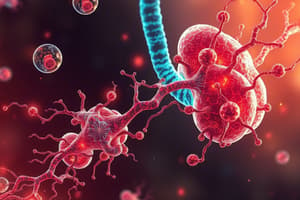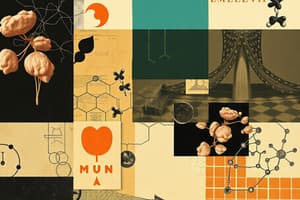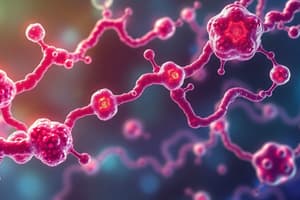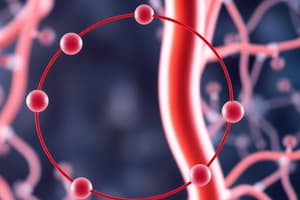Podcast
Questions and Answers
What is the role of Protein Phosphatase in the regulation of the PDH complex?
What is the role of Protein Phosphatase in the regulation of the PDH complex?
- It inhibits PDH activity in the presence of ATP.
- It phosphorylates PDH to activate it.
- It activates the PDH complex in the presence of high NADH.
- It reverses phosphorylation to restore PDH activity. (correct)
Which molecule is known to allosterically activate PDH phosphatase?
Which molecule is known to allosterically activate PDH phosphatase?
- Calcium ions (Ca2+)
- AMP (correct)
- ATP
- NADH
What is indicated when pyruvate is in high abundance in the context of PDH regulation?
What is indicated when pyruvate is in high abundance in the context of PDH regulation?
- ATP and NADH levels are sufficient.
- The PDH complex is inactivated and phosphorylated.
- There is a high need for producing more ATP. (correct)
- Calcium ions are not needed.
In the inactive form of the pyruvate dehydrogenase complex, what modification is present?
In the inactive form of the pyruvate dehydrogenase complex, what modification is present?
Which condition activates the PDH phosphatase to turn on the PDH complex?
Which condition activates the PDH phosphatase to turn on the PDH complex?
What effect does high ATP concentration have on pyruvate dehydrogenase activity?
What effect does high ATP concentration have on pyruvate dehydrogenase activity?
Which substance indicates that there is a low need for ATP production?
Which substance indicates that there is a low need for ATP production?
Which type of enzyme is involved in the activation of the PDH complex?
Which type of enzyme is involved in the activation of the PDH complex?
What is the primary product of pyruvate decarboxylation in cellular respiration?
What is the primary product of pyruvate decarboxylation in cellular respiration?
Which stage of cellular respiration follows the conversion of pyruvate to acetyl-CoA?
Which stage of cellular respiration follows the conversion of pyruvate to acetyl-CoA?
What is the role of the PDH complex in metabolism?
What is the role of the PDH complex in metabolism?
Which of the following is NOT one of the three enzymes of the PDH complex?
Which of the following is NOT one of the three enzymes of the PDH complex?
How many cofactors are involved in the production of acetyl-CoA from pyruvate?
How many cofactors are involved in the production of acetyl-CoA from pyruvate?
What is the main reaction catalyzed by the pyruvate dehydrogenase complex?
What is the main reaction catalyzed by the pyruvate dehydrogenase complex?
Which vitamin is a component of NAD?
Which vitamin is a component of NAD?
Which coenzyme is specifically known for its role in the PDH complex?
Which coenzyme is specifically known for its role in the PDH complex?
During cellular respiration, what is released as a byproduct when pyruvate is converted to acetyl-CoA?
During cellular respiration, what is released as a byproduct when pyruvate is converted to acetyl-CoA?
How do NADH and Acetyl-CoA affect the pyruvate dehydrogenase enzyme?
How do NADH and Acetyl-CoA affect the pyruvate dehydrogenase enzyme?
What function do the reduced electron carriers NADH and FADH2 serve in cellular respiration?
What function do the reduced electron carriers NADH and FADH2 serve in cellular respiration?
What role does pyruvate dehydrogenase kinase play in the regulation of the PDH complex?
What role does pyruvate dehydrogenase kinase play in the regulation of the PDH complex?
What happens to the intermediates of the PDH complex during the reaction?
What happens to the intermediates of the PDH complex during the reaction?
Which of these is a positive allosteric effector of the PDH complex?
Which of these is a positive allosteric effector of the PDH complex?
What type of modification primarily regulates the pyruvate dehydrogenase?
What type of modification primarily regulates the pyruvate dehydrogenase?
Which molecule would inhibit the activity of the pyruvate dehydrogenase complex?
Which molecule would inhibit the activity of the pyruvate dehydrogenase complex?
Flashcards are hidden until you start studying
Study Notes
Cellular Respiration Overview
- Aerobic conditions lead to the further oxidation of pyruvate into CO2 and H2O, a process called respiration.
- Cellular respiration consists of three main stages:
- Oxidation of organic fuel molecules (glucose, fatty acids, amino acids) to form acetyl-CoA.
- Entry of acetyl groups into the citric acid cycle, which oxidizes them to CO2.
- Energy conservation through the electron transport chain, generating ATP from reduced electron carriers NADH and FADH2.
Production of Acetyl-CoA
- Pyruvate is generated from glycolysis and undergoes decarboxylation to become acetyl-CoA and CO2.
- This conversion is facilitated by the pyruvate dehydrogenase (PDH) complex, found in mitochondria of eukaryotes and cytosol of prokaryotes.
Pyruvate Dehydrogenase (PDH) Complex
- Comprises three enzymes:
- Pyruvate Dehydrogenase (E1)
- Dihydrolipoyl Transacetylase (E2)
- Dihydrolipoyl Dehydrogenase (E3)
- Contains five cofactors, four of which are derived from vitamins:
- Thiamine pyrophosphate (TPP) from Vitamin B1
- Lipoate
- Coenzyme A (CoA-SH) from Vitamin B5
- Flavin adenine dinucleotide (FAD) from Vitamin B2
- Nicotinamide adenine dinucleotide (NAD) from Vitamin B3
Regulatory Proteins in PDH Complex
- The PDH complex includes regulatory proteins:
- Pyruvate Dehydrogenase Kinase (PDK)
- Phosphoprotein Phosphatase
- These proteins regulate the activity of the PDH complex.
Reaction Mechanism
- PDH catalyzes an irreversible oxidative decarboxylation of pyruvate where the carboxyl group is released as CO2, forming acetyl-CoA.
- Intermediates generated during this reaction remain bound to the enzyme complex and do not detach.
Regulation of PDH Complex
- Regulated by:
- Allosteric Effectors:
- Fructose-1,6-bisphosphate acts as a positive allosteric effector for E1.
- NADH and acetyl-CoA serve as negative regulators through feedback inhibition.
- Covalent Modification:
- PDK, stimulated by NADH and acetyl-CoA, phosphorylates PDH, inhibiting its activity.
- Protein phosphatase reverses this phosphorylation, reactivating PDH, influenced by AMP, NAD+, pyruvate, and Ca2+.
- Allosteric Effectors:
Summary of Regulation
- High levels of ATP or NADH lead to PDH phosphorylation and inactivation, indicating no need for ATP production.
- Conversely, low ATP levels or high demands (indicated by high pyruvate, AMP, or calcium) stimulate PDH activity through dephosphorylation, promoting ATP synthesis.
Studying That Suits You
Use AI to generate personalized quizzes and flashcards to suit your learning preferences.




